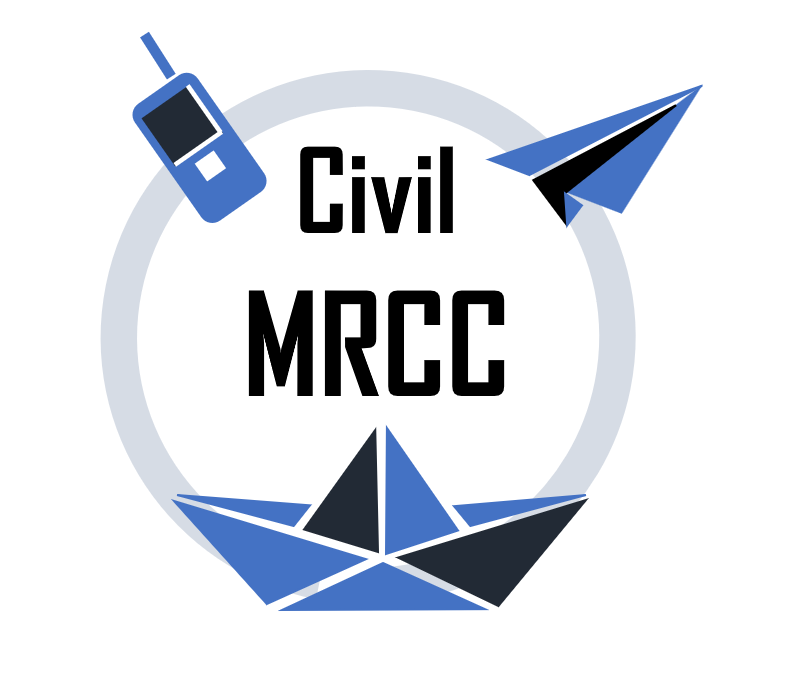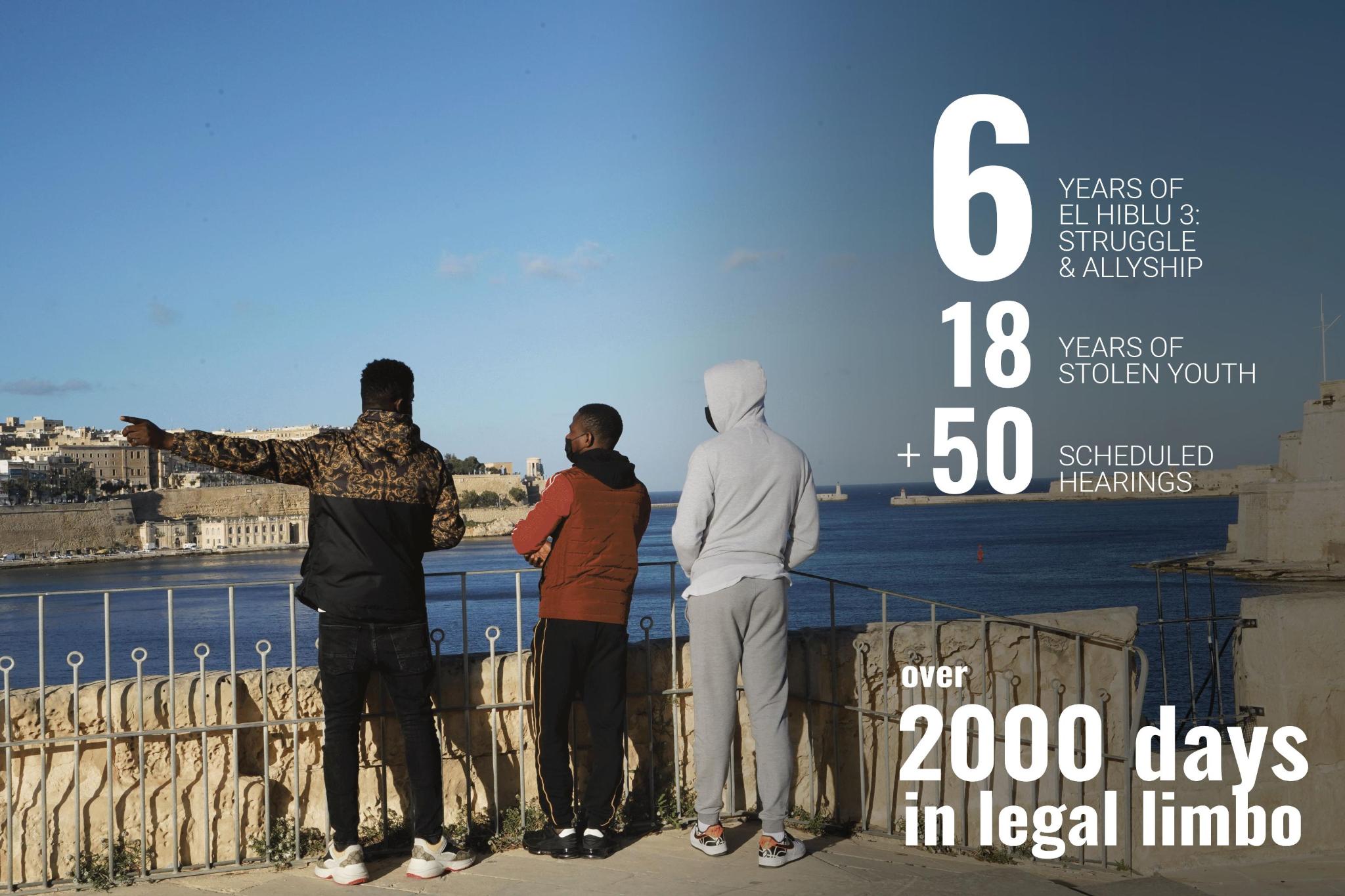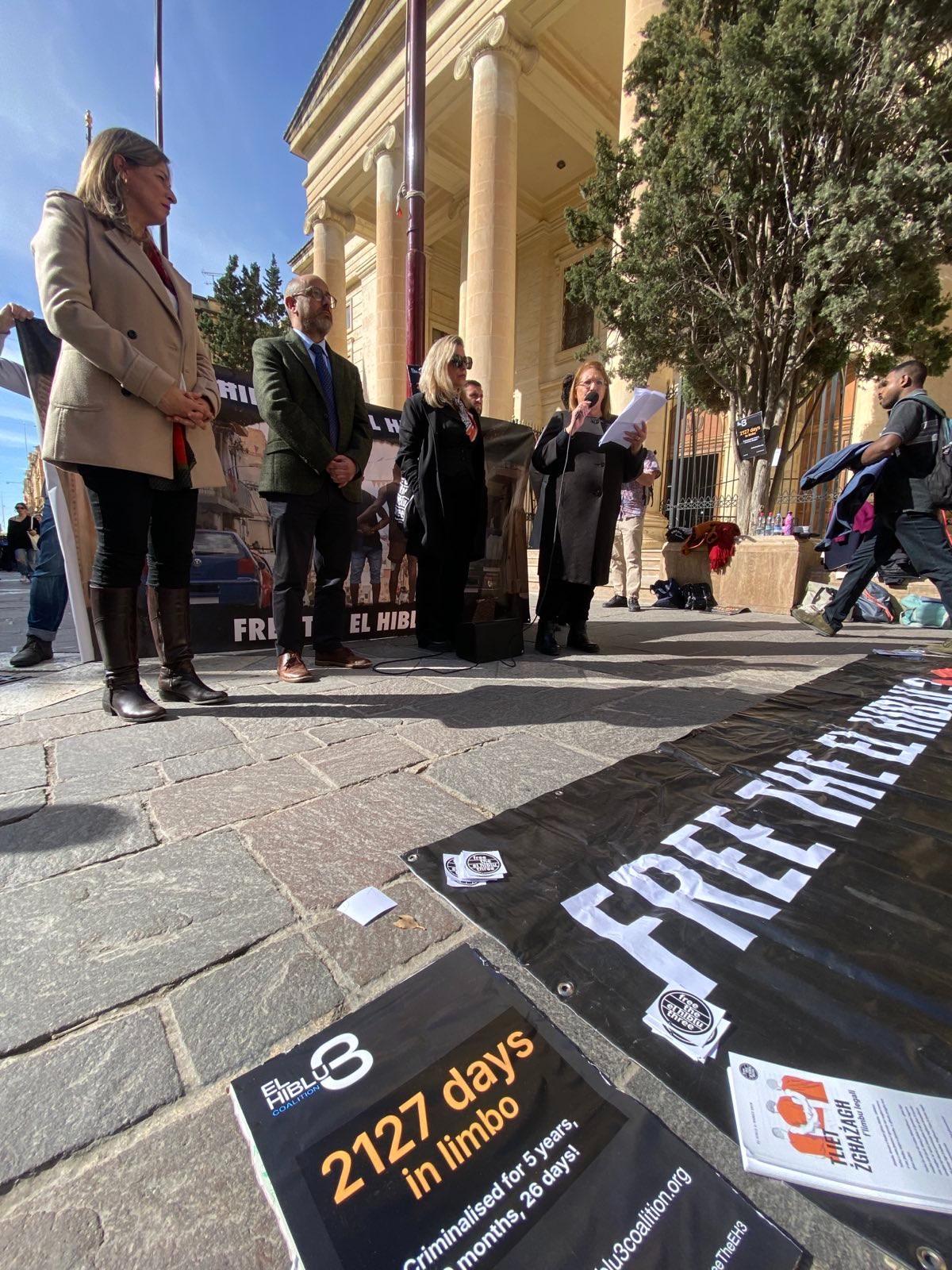By Daniela DeBono and Ċetta Mainwaring
In March 2019, three teenagers were rescued from a sinking rubber boat in the Mediterranean Sea. Amara was 15 years old and had already traveled from Guinea to Libya before attempting the crossing to Europe. Unknown to him at the time were two other teenagers: Kader was 16, a football enthusiast from the Ivory Coast; and 19 year old Abdalla, also from Guinea and traveling with his wife, Souwa. The three teenagers were traveling with 100 other people when they were rescued by an oil tanker, the El Hiblu 1, after their boat began to deflate.
That night, the El Hiblu 1 crew tried to return the travelers to Libya, despite assurances of helping them to reach Europe. In the early hours of the morning, people spotted Tripoli’s coastline and began to protest, terrified at the prospect of being returned to the violence they had known in Libya. Desperation was so high that people were ready to jump overboard. In this tense situation, the first mate called on Amara to translate, having identified him the day before as someone who spoke English. Eventually, the crew also called on the young Kader and Abdalla. The three acted as mediators and translators between frightened travelers and scared crew members.
The wider group’s protests convinced the captain to change course; he turned the ship north and motored towards Malta. Speaking to the Maltese authorities en route, he claimed his ship was no longer under his control – although testimonies in the subsequent compilation of evidence cast doubt on this claim. Nevertheless, upon arrival in Malta’s Valletta harbor, the three were arrested and immediately charged with nine crimes, including terrorism and confining someone against their will. These charges carry multiple life sentences, and echo the media narrative that took hold before the three even arrived in Malta, a narrative that painted them as pirates and hijackers.
Abdalla, Amara, and Kader – now also known as the El Hiblu 3 – have never known Malta as free men. Imprisoned for 8 months, initially in the maximum-security wing of the adult prison despite their young age, they were released on bail in November 2019 but required to register with the police every day and restricted in their daily movements. Legal experts and international organizations describe the charges that condition their lives as “grossly unjust,” “baseless,” and a “farce.”
For almost five years, the three young men have attended court hearings every month. As a whole, the testimonies corroborate what the El Hiblu 3 have always maintained that they are innocent. Moreover, the compilation of evidence, only the initial stage in the judicial process, has been painfully slow and riddled with failures, silences, and erasures. Despite calling numerous people to testify, including crew members and officials from the Armed Forces of Malta, the prosecution failed to call any of the 100 people who traveled with the El Hiblu 3 for two years. They only did so in March 2021 after the defense submitted an application to the court reminding the prosecution of its legal obligation to impartiality and its duty to bring forward all evidence at its disposal. Predictably, many of these key eyewitnesses had already left the island after two years, as secondary movements to other European countries are common.
Even when a handful were eventually given the opportunity to testify, silencing continued. Requests by some to testify in Bambara, a language widely spoken in West Africa, were denied. Witnesses also questioned the accuracy of the translation occurring in court, with the defense requesting a new translator. Yet, those who did testify confirmed Amara, Abdalla and Kader’s role as translators, and not as ring leaders.
Over these last years, a vast, transnational solidarity network has developed between local, international and intergovernmental organizations, convinced of the El Hiblu 3’s innocence and motivated by the injustice of pressing such charges against three teenagers. As the compilation of evidence unfolded, anger grew as information emerged that no weapons were found on board and no violence took place, and as people got to know the three. Despite their young age, despite the trial having already stolen much of their youth, they have displayed incredible strength and courage in the face of injustice. They have withstood imprisonment, adhered to strict bail conditions, appeared in court every month, all while building lives in Malta: studying, working, raising children, making friends and building a community.
As we have explored elsewhere, the solidarity network that has emerged to support and stand with Amara, Abdalla, and Kader reflects a transgressive form of solidarity that resists dominant state narratives and categories, and also creates counter-narratives through direct action. Alongside many protests, concerts, and conferences, the campaign to free the El Hiblu 3 published a book in 2021 which reflects the diverse voices of this network, with central contributions from Abdalla, Amara, and Kader. The El Hiblu case allows us to explore the ways in which transgressive acts—from autonomous migration to solidarity practices that occur at sea and within European territory—connect and challenge our conceptualization of borders, nation-states, and citizenship.
This case highlights the persistent criminalisation of people on the move in Europe today. The EU and its southern member states have attempted to contain people in Libya: they have turned militias into “EU partners,” funded detention centers, and coordinated pushbacks, with complete disregard for severe human rights violations carried out by these actors. In the name of deterrence, people in distress at sea are abandoned and those carrying out search and rescue activities are criminalized. Those who arrive face further punishment. Among other countries, Italy and Greece have used the law to target those they consider “boat drivers.” Malta, similarly, has weaponized the law against the El Hiblu 3, using them as political pawns in a spectacle of deterrence. The use of the law, by liberal democratic states, to undermine human rights raises questions of democracy, rule of law, and justice.
A few weeks ago, in November 2023, the Attorney General issued a bill of indictment formally charging Abdalla, Amara, and Kader with all the original accusations, despite the testimonies heard in the intervening period that point to their innocence and despite condemnation of the judicial process from legal scholars, international organizations and activists. According to Amnesty International, Malta’s Attorney General made the “worst possible decision” when she issued a bill of indictment that could lead to life sentences for the El Hiblu 3. Indeed, many have hailed the three young men as heroes whose mediation helped prevent an illegal pushback to Libya. With countless supporters, in Malta and beyond, we continue to stand with them in their fight for justice.
This text was published first in the blog of border criminologies:
https://blogs.law.ox.ac.uk/border-criminologies-blog/122
Website: https://elhiblu3coalition.org

Picture: El Hilblu 3 defendants. Credit: Joanna Demarco / Amnesty International



